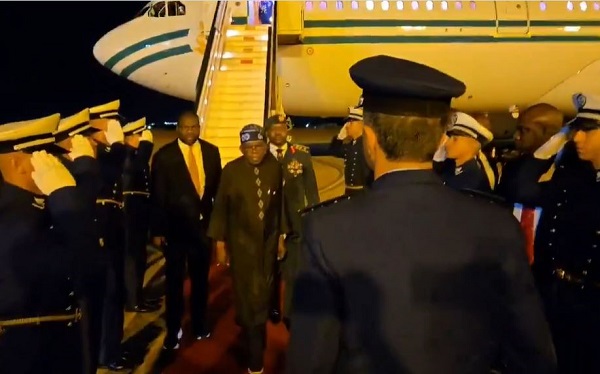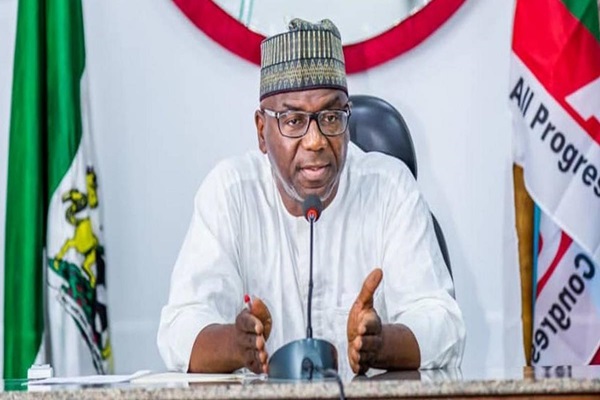
President Bola Ahmed Tinubu arrived in Brasília on Monday to begin a state visit aimed at deepening ties between Nigeria and Brazil through high-level meetings and the signing of several bilateral agreements.
The President, who flew in from Los Angeles, was received at the Brasília Air Base by senior Brazilian officials, including Ambassador Carlos Sérgio Sobral Duarte, Secretary for Africa and the Middle East, and Brazil’s Ambassador to Nigeria, Carlos José Areias Moreno Garcete.
According to a statement by the Special Adviser to the President on Information and Strategy, Mr Bayo Onanuga, Minister of State for Foreign Affairs, Bianca Ojukwu, was also present at the reception.
Other Ministers, Heads of key agencies and members of the private sector later joined to welcome the President at his hotel.
An official welcoming ceremony, complete with military honours, will be held at the Planalto Palace, where President Tinubu will meet President Luiz Inácio Lula da Silva.
Both leaders will hold a private discussion followed by expanded bilateral talks between senior officials from the two governments.
They are expected to witness the signing of Memoranda of Understanding (MoUs) before addressing a joint press conference.
During the visit, President Tinubu will also hold meetings with the President of the Brazilian Senate, the President of the Chamber of Deputies, and the President of the Supreme Federal Court.
He will participate in the Nigeria-Brazil Business Forum, which is expected to bring together top business leaders from both countries.
Nigeria and Brazil share a long history of cordial relations dating back to the early 1960s.
Brazil was the only Latin American country that took part in Nigeria’s independence celebrations in 1960 and Nigeria established its embassy in Brazil in 1966.
In recent years, the relationship has been marked by frequent high-level exchanges. President Tinubu led Nigeria’s delegation to the BRICS Leaders’ Summit in Rio de Janeiro in July 2025 and also attended the G20 Summit in Brazil in November 2024.
Earlier this year, Brazil’s Foreign Minister Mauro Vieira visited Abuja, while Brazilian Vice President Geraldo Alckmin and his wife attended the Second Session of the Mechanism for Strategic Dialogue in Abuja in June.
The Dialogue, established by a 2013 MoU, provides a platform for cooperation in agriculture, trade, defence, energy, and other sectors.
Its most recent session in June 2025 produced seven new agreements covering defence, energy, livestock development, tourism, audiovisual production, and counternarcotics.
Brazil remains a critical partner in Nigeria’s food security programme. A $2.5 billion JBS investment deal signed in 2024 is expected to strengthen supply chains, boost local production, and create jobs.
The Green Imperative Programme, a $1.1 billion agricultural mechanisation initiative launched in 2019, also continues, with plans to supply 10,000 tractors and 50,000 farm implements for local assembly in Nigeria.
Speaking on the expected outcomes from the state visit Special Adviser to the President on Media and Public Communications, Mr. Sunday Dare, had described the trip as a strategic move to deepen ties with Brazil, a key member of the BRICS bloc, and to diversify Nigeria’s partnerships beyond traditional allies.
Dare who spoke on live interview with TVC on Sunday said “this is the third visit of President Tinubu to Brazil, and it is with justifiable cause. It reflects a renewed and focused effort to build lasting economic integration between our countries — a journey that started 21 years ago under President Obasanjo and has gained fresh momentum under President Tinubu”.
He pointed to demographic similarities between both nations as a natural basis for closer ties, noting Nigeria’s population of about 238 million projected in 2025, which closely mirrors Brazil’s 213 million.
He also highlighted Brazil’s thriving agribusiness sector, which boasts a cattle herd larger than its human population, as a model for Nigeria’s livestock development.
Tinubu’s current visit is expected to further cement these ties, translating long-standing diplomatic goodwill into concrete economic and development gains for both nations.


